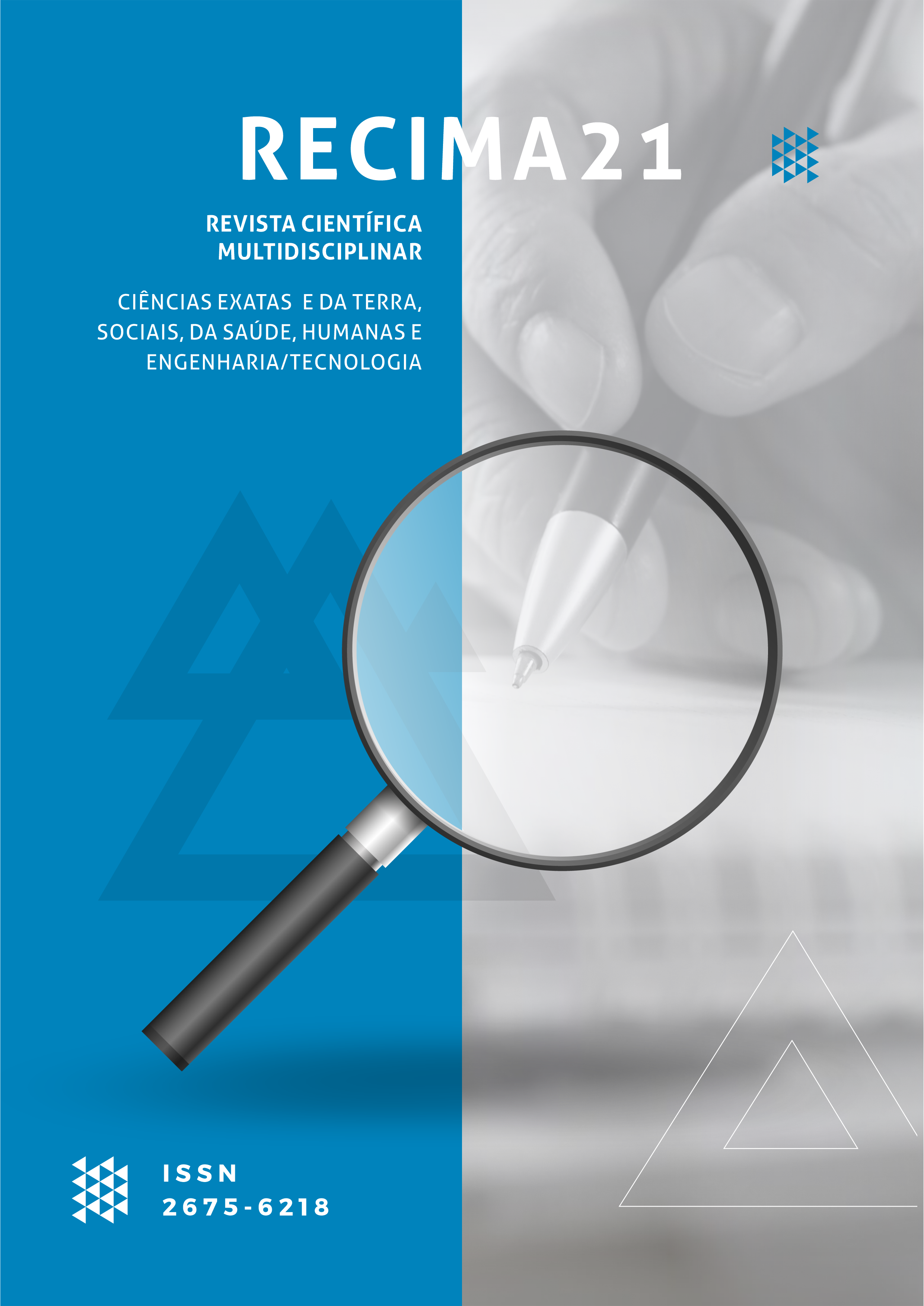PUBLIC POLICIES OF INCLUSION IN FACE-TO-FACE EDUCATION AND EAD
DOI:
https://doi.org/10.47820/recima21.v3i12.2359Keywords:
study seeks to analyze inclusive education in the 21st centuryAbstract
The study sought to analyze the inclusive education of the 21st century and its respective Public Policies for Inclusion by Distance Education. The process is overlawed by specific legislation, which have driven the need to reinvent, in a certain way, some accommodated, with practice remains the challenge, if it really meets what is established in law. Thus, the general objective of the study is to present special and inclusive education, highlighting the struggles for social inclusion in curricula, especially for Special Education, in the modality of Distance Education. Present the importance of training education professionals to work with differentiated teaching strategies in the view of the Curriculum as a tool in the teaching/learning process and work on special educational needs for strategies that can favor knowledge, understanding, reflection, inclusion and citizenship within classrooms, stimulate the training of enlightened citizens regarding this theme and enable understanding and awareness special educational needs, more precisely, encourage inclusion and citizenship in the school space in parallel. The methodological procedure for preparing the study was developed by exploratory bibliographic research, consultations in books, journals, websites and academic papers related to the theme.
Downloads
References
BARBOSA, José Juvêncio. Alfabetização e leitura. São Paulo: Ed. Cortez, 1990.
BARDIN, L. Análise de conteúdo. 1a ed. São Paulo: Almedina Brasil, 2011.
BRASIL. Lei de Diretrizes e Bases da Educação Nacional. Lei nº 9.394/96.
BRASIL. Estatuto da Criança e do Adolescente. Lei nº 8.069 de 13 de junho de 1990.
CABRAL, L. S. Processos psicolinguísticos de leitura e a criança. Porto Alegre: Letras de Hoje, v. 19, n. 1, pp. 7-20, 1986.
CAGLIARI, Carlos. Alfabetização e Linguística. São Paulo: Ed. Scipione, 1996.
CIÊNCIAS, Educação. Inclusão social, educação inclusiva e educação especial: enlaces e desenlaces. Bauru, v. 23, nº 01, pp. 01-06, 2017. E. P.
Camargo. Disponível no site:
https://www.google.com/url?sa=t&rct=j&q=&esrc=s&source=web&cd=1&cad=rj a&uact=8&ved=2ahUKEwif3vfukMThAhUqGbkGHbMzA9MQFjAAegQIBRAC& url=http%3A%2F%2Fwww.scielo.br%2Fpdf%2Fciedu%2Fv23n1%2F15167 313- ciedu-23-01-0001.pdf&usg=AOvVaw0wfzwebfUHAB-uuz-qr2LC. Acesso em 13 de jun. de 2021.
FREIRE, P. Pedagogia da autonomia: saberes necessários à prática educativa.
ed. São Paulo: Paz e Terra, 2005.
FOUCAMBERT, Jean. A leitura em questão. Porto Alegre: ARTMED, 1994.
GADOTTI, M.; ROMÃO, J. Autonomia da escola: princípios e propostas.
São Paulo: Cortez, 1997.
GARCIA, Othon M. Comunicação em prosa moderna; aprenda a escrever, aprendendo a pensar. 17.ed. Rio de Janeiro: Editora da Fundação Getúlio
Vargas, 1996.522p
GIL, A. C. Como elaborar projetos de pesquisa. São Paulo: Atlas, 2002
Gil, A. C. Métodos e técnicas de pesquisa social. São Paulo: Atlas, 2008.
GLAT, Rosana. A integração social dos portadores de deficiência: uma reflexão. Rio de Janeiro: Sette Letras, 1995
GLAT, Rosana. Educação Especial: A integração Social dos portadores de deficiência, uma reflexão. Vol. I 2ª edição. Ed. Eletrônica – 1998
MACIEL, M. R. C. Portadores de deficiência: a questão da inclusão social. São Paulo em Perspetiva, São Paulo, v. 14, n. 2, p. 51-56, 2000. http://dx.doi.org/10.1590/S0102-88392000000200008 Acesso em 12 de junho de 2021.
MANTOAN, M.T.H. A integração de pessoas com deficiência. São Paulo:
Senac, 1997
MAZZOTTA, M.J.S. Educação Escolar: Comum ou Especial. São Paulo:
Pioneira, 1982
MAZZOTTA, M.J.S. Educação Especial no Brasil. São Paulo: Cortez,1996. PESSOA, Gustavo Pereira; COSTA, Fernanda de Jesus. Technological Pedagogical Content Knowledge (TPACK) no ensino de Ciências: qual é a possibilidade. Encontro Nacional de Pesquisa em Educação em Ciências (ENPEC), 2015. In: Anais do ENPEC, 2015.
MENEGASSI, Renilson José; CALCIOLARI, Angela Cristina. A leitura no vestibular: a primazia da compreensão legitimada na prova de Língua Portuguesa. Maringá: UEM – Acta Scientiarum, v. 24, n. 1, pp. 81-90, 2002.
MENEGASSI, Renilson José. Compreensão e interpretação no processo de leitura: noções básicas ao professor. Maringá: Revista UNIMAR, v.17, n. 1, pp. 85-94, 1995.
MESZÁROS, István. A educação para além do capital. São Paulo:
Boitempo, 2008, p. 55.
R.G, PRIETO-1997 Políticas da inclusão: Compromisso do poder público, da escola e dos professores.
PALO, Maria José; OLIVEIRA, Maria Rosa D. Literatura Infantil: voz de criança.
ed., 2. impressão, São Paulo: Ed. Ática, 2001.
PIMENTA, S.; ANASTASIOU, L. Docência na Educação Superior. São Paulo:
Cortez, 2002.
Ressarce, Society and Development, v. 11, n. 1, e23011124763, 2022
(CC BY 4.0) | ISSN 2525-3409 | DOI: http://dx.doi.org/10.33448/rsd-v11i1.24763
SASSAKI, Romeu Kazumi. Construindo uma sociedade inclusiva. Rio de Janeiro:
Ed W.V.A, 1997
SILVA, Ezequiel Theodoro. Elementos de Pedagogia da Leitura. São Paulo:
Ed. Martins Fontes, 1998.
SOARES, Magda Becker. Letramento: um tema em três gêneros. 2. ed., 5.
reimpressão, Belo Horizonte: Ed. Autêntica, 2002.
SOLÉ, I. Estratégias de leitura. 6. ed., Porto Alegre: Ed. Artmed, 1998.
. 2008. Presidência da República. Casa Civil. Subchefia para Assuntos Jurídicos. Política nacional de educação especial na perspectiva da educação inclusiva. Brasília. Disponível no site: , Acesso em 04 de junho de 2021.
VASCONCELLOS, C. S. Coordenação do trabalho pedagógico: do projeto político pedagógico ao cotidiano da sala de aula. São Paulo: Libertad, 2002.
WERNECK, Claudia. Ninguém mais vai ser bonzinho na sociedade inclusiva.
Rio de Janeiro: ED. W.V.A, 1997.
Downloads
Published
Issue
Section
Categories
License
Copyright (c) 2022 RECIMA21 - Revista Científica Multidisciplinar - ISSN 2675-6218

This work is licensed under a Creative Commons Attribution 4.0 International License.
Os direitos autorais dos artigos/resenhas/TCCs publicados pertecem à revista RECIMA21, e seguem o padrão Creative Commons (CC BY 4.0), permitindo a cópia ou reprodução, desde que cite a fonte e respeite os direitos dos autores e contenham menção aos mesmos nos créditos. Toda e qualquer obra publicada na revista, seu conteúdo é de responsabilidade dos autores, cabendo a RECIMA21 apenas ser o veículo de divulgação, seguindo os padrões nacionais e internacionais de publicação.













